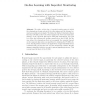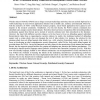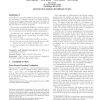14 search results - page 2 / 3 » Game Theory with Learning for Cyber Security Monitoring |
COLT
2003
Springer
13 years 10 months ago
2003
Springer
We study on-line play of repeated matrix games in which the observations of past actions of the other player and the obtained reward are partial and stochastic. We define the Part...
CCS
2006
ACM
13 years 9 months ago
2006
ACM
Machine learning systems offer unparalled flexibility in dealing with evolving input in a variety of applications, such as intrusion detection systems and spam e-mail filtering. H...
ATAL
2009
Springer
14 years 3 days ago
2009
Springer
While the class of congestion games has been thoroughly studied in the multi-agent systems literature, settings with incomplete information have received relatively little attenti...
INFOCOM
2012
IEEE
11 years 8 months ago
2012
IEEE
Wireless Sensor Networks (WSNs) are no longer a nascent technology and today, they are actively deployed as a viable technology in many diverse application domains such as health ...
PODC
2004
ACM
13 years 11 months ago
2004
ACM
Secure function evaluation (SFE) enables a group of players, by themselves, to evaluate a function on private inputs as securely as if a trusted third party had done it for them. ...



